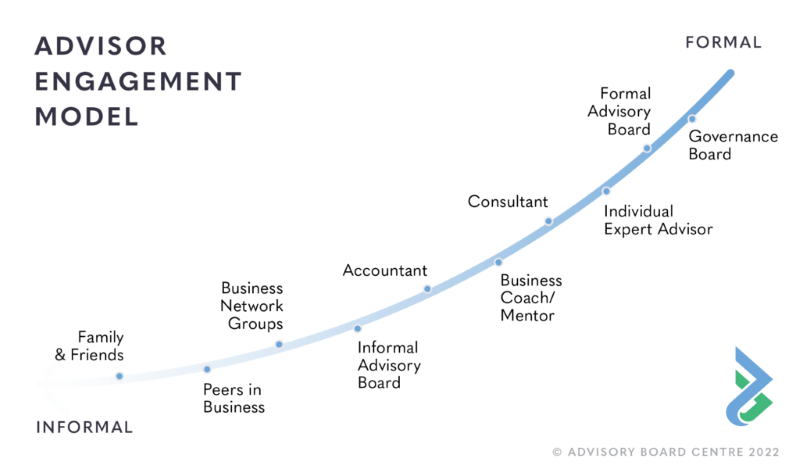
Leveraging advisors to accelerate your growth strategy
The way we work has evolved considerably in recent decades. Progressive businesses must respond rapidly to an ever-changing market and business leaders wanting to elevate their business to the next level are striving to access current, ground-breaking thinking. Is your business growth strategy stuck or business transition not clear? An Advisory Board is a group of professionals that provides independent strategic advice to an organisation to assist with their decision making on these two key business decisions.
The advice provided by an Advisory Board is non-binding and there is greater flexibility in the structure and management of Advisory Boards as compared to a Board of Directors. Business Owners, CEO’s and governance boards can utilise an Advisory Board as a problem solving model without giving up decision making control or authority in the business.
Benefits of an advisory board
• Draws on the expertise of advisors who have practical experience growing a business.
• Enhances the company’s reputation and credibility in the marketplace.
• Increased confidence of your customers, investors, and lenders.
• Attracts talented employees by demonstrating a commitment to growth.
• Creates a potential source of directors for the governance board.
• Tests the quality of “outsider” contributions to family businesses.
As businesses grow, the nature of their advisory needs, the resources available to meet them and the kinds of advisors they draw on, also changes. While there is no single, right or wrong approach, there will likely come a time when a desire to drive strategy or achieve certain results means a formal Advisory Board provides the best chance of success.
Advisor engagement model
Many business owners have a trusted, informal network that they access to “bounce an idea off” or to “pick each other’s brains”. These networks, such as your industry association, are invaluable. Formalising your access to high-quality and successful advisors through an Advisory Board takes this process to a new and exciting level. There are other advisors such as your banker, private equity investors or venture capital. While they are advisors in their area of expertise, managing their ownership rights and whether they should be on your governance (decision making) board may be restrictive or difficult to manage.
Unlike a Board of Directors, Advisory Boards have no fiduciary responsibilities. They are problem-solvers, not decision-makers. Their role is to help you succeed by bringing the benefits of their wide-ranging experience and expertise to your business.
Formalising your advisory needs
A formal advisory board is not a one size fits all approach. Business owners need to carefully consider their business priorities and the advisor profiles that will best support their needs. The process needs to be carefully managed to be sustainable and help drive a net economic impact for the business. Triggers that may prompt considering an advisory board include a growth strategy that’s not delivering, business transition, wanting to expand into anew market segment or geography, need to raise funds, or considering an acquisition.
Implementing a formalised Advisory Board starts with a Board Readiness Assessment. This is a guided process, conducted by an independent Certified Chair, designed to support businesses in evaluating their key priorities and what advisory structure is best for their needs. Advisory boards can be used across the whole business, alongside an existing governance board or for specific projects. If a formalised Advisory Board is the best approach, it will include a defined charter, meeting structure and Advisors with the skillsets, experience and connections needed to drive results.
Craig Hook
Strategy and Business Transformation Expert
Craig Hook has been working with boards on improving their performance and chairs advisory boards for private and family companies. Apart from the measurable impact of achieving business growth goals, Craig sees the key benefit of a formal advisory board for business owners is moving them from “working IN the business, to working ON the business”.
If you are interested in learning more about Craig and his workshops on Essemy, please visit this link.
Find a Training Solution:
Leadership Development Workshops | Leadership Development Experts | Leadership Development Coaches